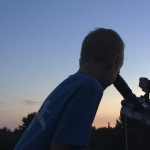
The Portland Science Center, with their new Space exhibit, and Cornerstones of Science have recently partnered together to incorporate a library telescope into the Space exhibit!
You will see the library telescope (an Orion StarBlast 4.5″ Reflector Telescope on a Dobsonian base) with a banner explaining what you can do to learn more about space.
“Take that next step and experience space in your own backyard by checking-out a library telescope from your local public library. Over fifty libraries in Maine have Orion StarBlast 4.5 inch Reflector telescopes to check-out like you do a book!
Cornerstones of Science and public libraries have partnered to make this happen. Cornerstones is an informal science organization that works with libraries creating experiences of science that spark curiosity and foster a deeper connection to the world around us. Visit one of the public libraries listed below for a library telescope or encourage your local public library to participate.”
Library Name, City
Auburn Public Library, Auburn
Bangor Public Library, Bangor
Belfast Free Library, Belfast
Blue Hill Public Library, Blue Hill
Boothbay Public Library, Boothbay
Bowdoinham Public Library, Bowdoinham
Bridgton Public Library, Bridgton
Camden Public Library, Camden
Canaan Public Library, Canaan
Cary Library, Houlton
Casco Public Library, Casco
Cundy’s Harbor Library, Cundy’s Harbor
Curtis Memorial Librar,y Brunswick
D.A. Hurd Library, North Berwick
Falmouth Public Library, Falmouth
Gibbs Library, Washington
Hartland Public Library, Hartland
Ivan O. Davis Library, Liberty
Jackson Memorial Library, Tenants Harbor
Jefferson Public Library, Jefferson
Jesup Memorial Library, Bar Harbor
Lewiston Public Library, Lewiston
Limerick Public Library, Limerick
Lisbon Public Library, Lisbon
McArthur Public Library, Biddeford
Merrill Memorial Library, Yarmouth
Mildred Stevens Williams Memorial Library, Appleton
Newport Cultural Center, Newport
Northeast Harbor Library, Northeast Harbor
Orr’s Island Library, Orr’s Island
Patten Free Library, Bath
Pittsfield Public Library, Pittsfield
Portland Public Librar,y Portland
Prince Memorial Library, Cumberland
Raymond Public Library, Raymond
Rockland Public Library, Rockland
Scarborough Public Library, Scarborough
Shaw Memorial Library, Greenville
Skidompha Public Library, Damariscotta
South Paris Public Library South Paris
Southwest Harbor Library Southwest Harbor
Swans Island Public Library Swans island
Thompson Free Library, Dover-Foxcroft
Topsham Public Library, Topsham
Vassalboro Public Library, Vassalboro
Waterville Public Library, Waterville
William Fogg Library, Eliot
Windham Public Library, Windham
Winslow Public Library, Winslow
Wiscasset Public Library, Wiscasset
Witherle Memorial Library, Castine
York Public Library, York
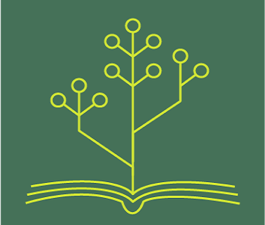


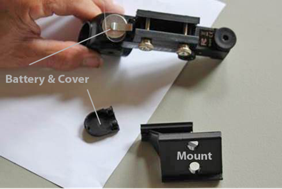
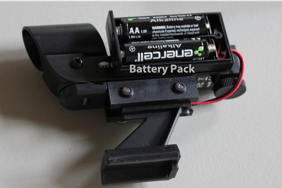


 For the entire the month of September Cornerstones of Science will receive $1 from each Hannaford Helps bag (Good Karma bag only) purchased at the Hannaford located in Brunswick, ME. This is an amazing opportunity for Cornerstones of Science not only to raise funds, but to also spread awareness about our cause within the community.
For the entire the month of September Cornerstones of Science will receive $1 from each Hannaford Helps bag (Good Karma bag only) purchased at the Hannaford located in Brunswick, ME. This is an amazing opportunity for Cornerstones of Science not only to raise funds, but to also spread awareness about our cause within the community.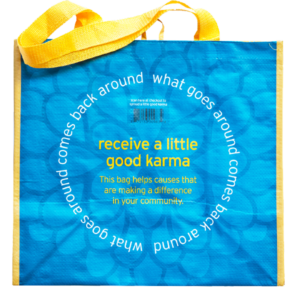 Please show your support by purchasing these beautifully designed reusable bags! They can be found on the reusable bag rack and at various registers. As a reminder, the Hannaford Helps bag features the good karma message. We strongly encourage you to share this news with family and friends as well!
Please show your support by purchasing these beautifully designed reusable bags! They can be found on the reusable bag rack and at various registers. As a reminder, the Hannaford Helps bag features the good karma message. We strongly encourage you to share this news with family and friends as well!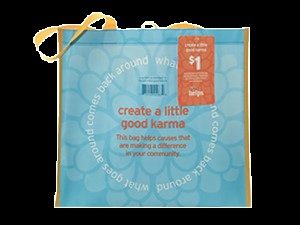
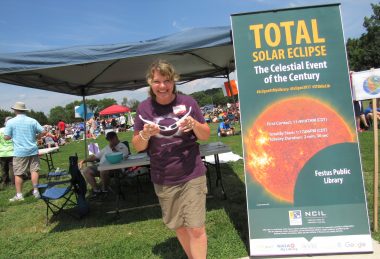
 Cornerstones of Science’s Program and Library Support Manager Sarah Post spent the day of the eclipse in Festus, MO as part of her work on the NASA@MY Library project. The Festus Public Library is one of three pilot libraries in the US on the project and with much planning over a year’s time with numerous partners, the day of the eclipse in Festus was a huge community success and one Sarah and others around the US will not forget.
Cornerstones of Science’s Program and Library Support Manager Sarah Post spent the day of the eclipse in Festus, MO as part of her work on the NASA@MY Library project. The Festus Public Library is one of three pilot libraries in the US on the project and with much planning over a year’s time with numerous partners, the day of the eclipse in Festus was a huge community success and one Sarah and others around the US will not forget.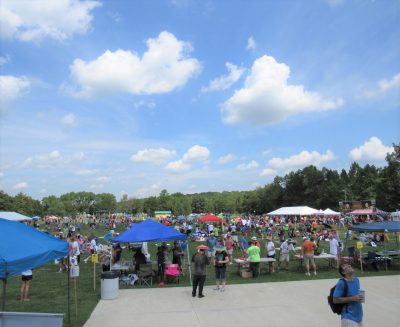 Over 5,000 people attended an all-day outdoor event on August 21, 2017 in West City Park in Festus, which is about a 40-minute drive south of St. Louis. Fifteen hands-on science activities were ongoing throughout the day facilitated by scientists, librarians, and volunteers. People from all over the world were in attendance as well as those who drove in from surrounding states and those who only lived minutes away. First contact (the beginning of the partial eclipse) began at 11:49am with totality starting at 1:17pm and lasting for two minutes and 36 seconds. Partners included Festus Public Library, Town of Festus, St. Louis Science Center, St. Louis Astronomical Society, the Space Science Institute, Cornerstones of Science, and local vendors.
Over 5,000 people attended an all-day outdoor event on August 21, 2017 in West City Park in Festus, which is about a 40-minute drive south of St. Louis. Fifteen hands-on science activities were ongoing throughout the day facilitated by scientists, librarians, and volunteers. People from all over the world were in attendance as well as those who drove in from surrounding states and those who only lived minutes away. First contact (the beginning of the partial eclipse) began at 11:49am with totality starting at 1:17pm and lasting for two minutes and 36 seconds. Partners included Festus Public Library, Town of Festus, St. Louis Science Center, St. Louis Astronomical Society, the Space Science Institute, Cornerstones of Science, and local vendors.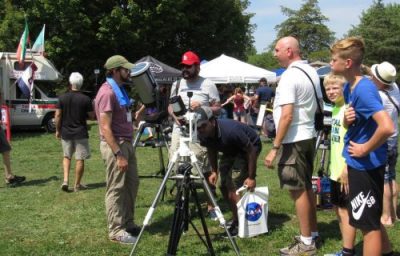 The Festus Public Library director Kathy Condon-Boettcher was the foundation for the event’s success by coordinating with all the partners and attending eclipse task force events and training throughout the year all the while still running the library. A big thanks goes to her and her staff.
The Festus Public Library director Kathy Condon-Boettcher was the foundation for the event’s success by coordinating with all the partners and attending eclipse task force events and training throughout the year all the while still running the library. A big thanks goes to her and her staff.


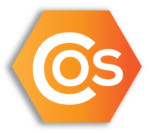 Cornerstones of Science Website
Cornerstones of Science Website




